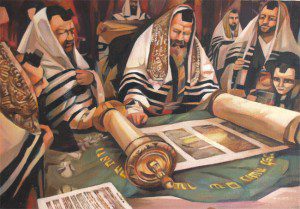“I remember a select little group with which we traveled and camped together for some days; this group had undertaken to liberate some captive League brothers and the Princess Isabella from the hands of the Moors. It was said that they were in possession of Hugo’s horn, and among them were my friends the poet Lauscher and the artists Klingsor and Paul Klee; they spoke of nothing else but Africa and the captured princess, and their Bible was the book of the deeds of Don Quixote, in whose honor they thought of making their way across Spain.” Herman Hesse, Journey to the East
Here’s a truth: All books were written by people. Whatever is said about the book, that it was channeled from extra-terrestrials, angels, gods, or God, it was written by people. It will contain mistakes, errors, and internal contradictions.
A major mistake: Treating any book as the unalloyed word of God. There is no such thing.
Another mistake: Thinking we’re really on our own here. We are surrounded by great clouds of witnesses. People have walked on this planet, have opened their hearts and their minds and have found what is necessary to heal our wounds, and even the great wound. And if something has proven to be a sacred text for people, even if not specifically for our people, who ever that category might be, we should approach those sacred texts with a certain respect.
I recall when I read the Koran. At first it was simply an assignment I gave myself. I have little heart sympathy with the style of Islam. It reminds me too much of my Baptist upbringing. Although I was cautioned from the beginning about being too judgmental, as Sufism, Islam’s mystical school, or more properly, schools, are clearly amazing things, genuine schools of the heart. So, I began to read it. And by the time I was half way through I was nearly half way convinced. Even in an English translation the poetry of the thing, the power of the message of a creator singing possibility into the world was comforting and challenging.
And one read was enough for me. I’ve had similar experiences with other spiritual texts from the world’s traditions, grateful for a single read. The Bhagavad Gita is like that. Although, I’ve been thinking of parts of the Gita’s message about embracing our dharma, our place in the world wholeheartedly, quite a bit in recent years.
Other books have insinuated themselves into my heart and I do visit them with greater regularity. The Tao Te Ching, for one. Chuang Tzu’s Inner Chapters, are another. Parts of the Bible, particularly the book of Job and a couple of the psalms have been engraved on my heart. Probably the most important books for me, the ones I’ve visited and revisited over the years are the great Twelfth century koan anthologies, the Gateless Gate, the Blue Cliff Record, and the Book of Serenity. I’ve also have a love hate relationship with Keizan’s masterwork, his thirteenth century anthology of the awakening stories of my Zen ancestors, the Transmission of the Lamp.
Other books have touched me deeply, as well. Not to mention specific poems like Rilke’s Ninth Duino Elugy, Elliot’s Four Quartets, and Mary Oliver’s In Blackwater Woods.
I’m sure each of us, as we live into our lives, have found books and poems that touch us in particularly powerful ways.
That have become our scriptures.
The difficulty here is in our picking and choosing. We need to pick. We need to choose. And the very act of doing that cuts us off from many things. We need to make choices, there are just too many things out there, and we need to find something, to make it ours, and to dig deep.
But we need to be careful about how quickly it is that we make those choices. We need to be careful about simply following our own appetites, our prejudices, rather than our need to know deeply.
So, sometimes we need just to pick something big enough and diverse enough to hold our hearts for a lifetime. Perhaps it is the Koran. Maybe the Bible.
The name for a sacred text in Buddhism, is Sutra. And sutra means thread.
We need something we can follow all the way to the bottom.
And at some point we need to focus, and to give ourselves over to a smaller handful among the many options.
To give it focus.
To live into it.
To let it live into us.
Into you.
Into me.
We need something we can be challenged by. And we need something we can challenge. Don’t forget, all books are written by people.
And, with that a question: What might that be for you?
What is your book?
What is your sacred text?













